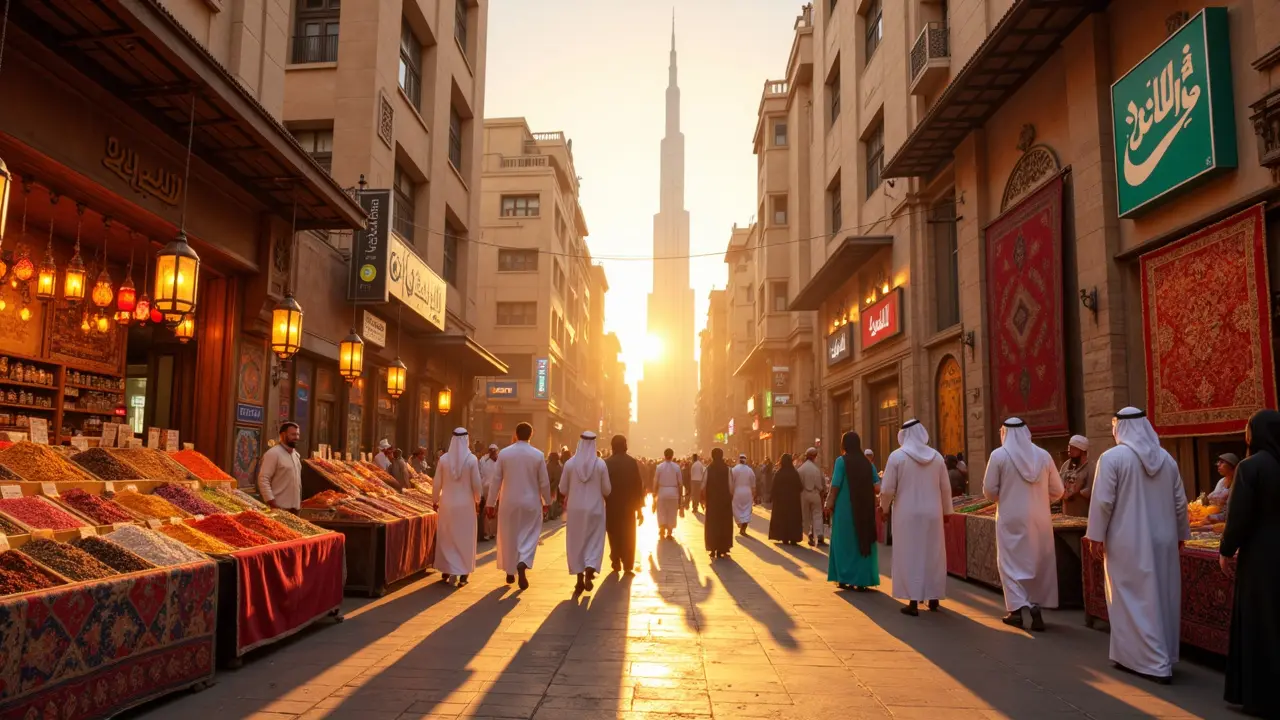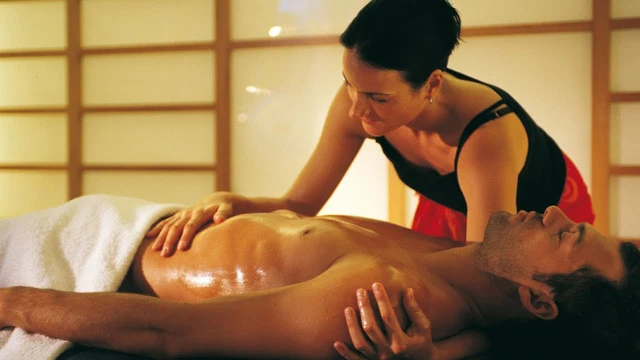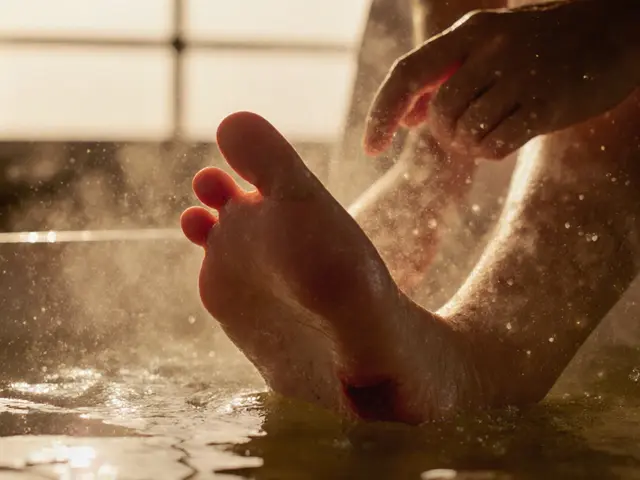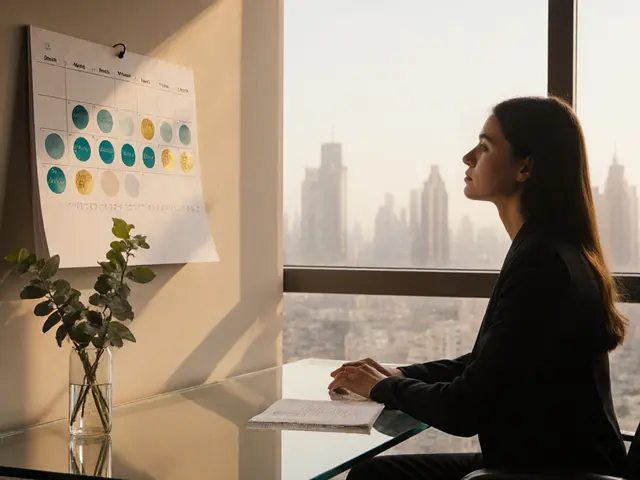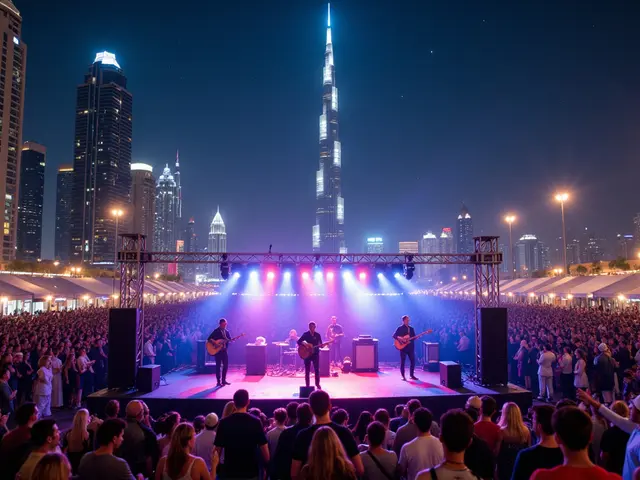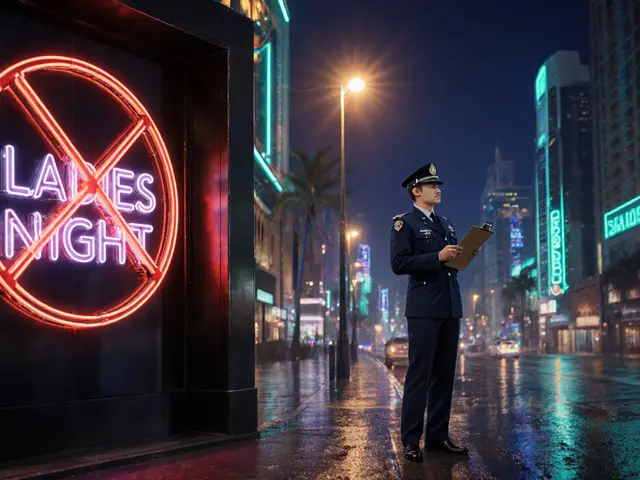Ever tried camel milk gelato in Dubai? Or ducked into an alley for Arabic coffee made the old way? Dubai's packed with cultural treasures, but you’ve got to know where to look. The city’s not just about glitzy malls and towering glass buildings—it’s about winding souks, smoldering spices, buzzing art hubs, and traditions that shape daily life.
Wander through Al Fahidi Historical Neighbourhood and you’ll feel like you’ve time-traveled. Here’s where wind towers rise above sand-colored walls, where artists set up in cozy studios, and where you can swing by the Sheikh Mohammed Centre for Cultural Understanding for homemade Emirati breakfast. Feeling bold? Join a majlis session and ask all your burning questions about local customs—people here love to explain how things work.
Adventurous spirits can leave the tourist map behind and hunt for hidden gems in Deira’s Gold Souk or the Iranian spice market—don’t be shy, haggling is half the fun. Love art? Alserkal Avenue in Al Quoz is an industrial area turned creative haven, lined with galleries and indie cafes. Drop by during one of their pop-up nights and mingle with Dubai’s artists over street food and live music.
- Tasting Dubai: Food, Coffee, and Hidden Eateries
- Old Dubai: Souks, Heritage, and Traditional Neighborhoods
- Meeting the Modern: Street Art, Design District, and Museums
- Festivals, Events, and Cultural Classes
- Tips for Respectful Exploring in Dubai
Tasting Dubai: Food, Coffee, and Hidden Eateries
If you ask people what they remember most about Dubai culture, food tops the list. Dubai’s food scene is wild—a mash-up of tastes from the Middle East, South Asia, Africa, and Europe. Forget the fancy hotel buffets for a second. The real action is in local spots that have become legends for travelers and longtime residents alike.
Let’s talk must-try bites:
- Al Harees: Slow-cooked wheat and meat, usually served at Emirati homes during Ramadan and Eid. You’ll also find it at restaurants like Al Fanar and Al Khayma Heritage.
- Shawarma: Yes, you’ve had one, but not like this. Order it from Al Mallah on 2nd December Street late at night for the classic Dubai street experience.
- Machboos: Dubai’s version of spiced rice with chicken or lamb—find it at Arabian Tea House in Al Fahidi, a favorite among locals.
- Luqaimat: Sweet fried dough balls drizzled in date syrup, sold at most traditional markets and especially at Global Village when it’s in season.
Now, the coffee—Dubai takes its coffee traditions seriously. Grab a seat at the Coffee Museum in Al Fahidi. You’ll learn the difference between gahwa (Arabic coffee with cardamom) and fancy international blends. Fancy some African beans roasted by a Dubai-based company? Drop by RAW Coffee Company in Al Quoz or Nightjar Coffee in Alserkal Avenue—they’re often packed with locals and expats alike.
There’s an underground food scene too. The Afghan Kebab House in Deira doesn’t have a big sign, but you’ll smell the charcoal as you walk by. Plenty of Filipino cafeterias in Karama dish out silog breakfasts for under AED 20. If you want something uniquely Dubai, try camel burgers at Switch Restaurant in The Dubai Mall or camel milk ice cream at Nouq.
Here’s a look at some average prices so you can plan your adventure:
| Dish/Drink | Typical Price (AED) | Where to Find |
|---|---|---|
| Al Harees (main) | 35-50 | Al Khayma Heritage |
| Shawarma (wrap) | 7-15 | Al Mallah, Automatic Restaurant |
| Gahwa (Arabic coffee) | 10-18 | Coffee Museum, Arabian Tea House |
| Camel Milk Gelato | 20-28 | Nouq, markets |
If you want to eat like a local, follow Dubai residents: hit Al Safa Park on a Friday for food truck pop-ups, or walk the lanes behind Bur Dubai’s Meena Bazaar for hidden diners with hand-written menus. Don’t fear the lines—if people are waiting, it’s worth it.
Old Dubai: Souks, Heritage, and Traditional Neighborhoods
If you want to see the roots of Dubai culture, Old Dubai is where to go. Most folks stick to Downtown and Marina, but the real stories are in the twisting lanes of Deira and Bur Dubai. These neighborhoods have been here way before the skyscrapers showed up. They're the heart of Dubai’s trading past, and you can feel it at every turn.
Start with the Gold Souk in Deira—grab your sunglasses, because the shop windows are stacked with more than 350 jewelry stands, glittering with 24-karat gold. There’s even a Guinness World Record gold ring on display (it weighs almost 64 kg). Haggling is expected, so don’t accept the first price. Next up, the Spice Souk is just a short stroll away. Here, the air smells of cardamom, saffron, dried lemons, and all sorts of things you’ve probably only ever tasted in small doses. Vendors happily let you sample before you buy.
Need something practical? Take an abra ride for just AED 1 across Dubai Creek, the original lifeline for traders. These wooden boats haven’t changed much in decades and run from morning until past midnight. It's the cheapest and most scenic way to get a feel for the old city.
Al Fahidi Historical Neighbourhood (sometimes called Al Bastakiya) is another must-see. The narrow alleys and wind towers here were built in the late 1800s by Persian merchants. Now, you’ll find tiny museums (like the Coffee Museum), artists’ studios, and places to try an Emirati meal. Many residents still host cultural tours—ask about the next guided walk at the Dubai Culture & Arts Authority center inside the quarter.
| Location | Main Attraction | Opening Hours | Tip |
|---|---|---|---|
| Gold Souk, Deira | 350+ gold shops | 10am-10pm | Haggle for the best price |
| Spice Souk, Deira | Spices, herbs, teas | 9am-10pm | Ask for samples |
| Al Fahidi Neighbourhood | Heritage houses, museums | 7:30am-8:30pm | Join a culture breakfast |
| Abra Ride | Crossing Dubai Creek | 5am-midnight | Carry coins for ticket |
If you’re visiting during the cooler months, try a walking tour that kicks off around sunset to catch the call to prayer echoing off the mosque walls—it adds a whole new layer to the atmosphere. For families, Heritage Village in Shindagha is a winner. They run traditional craft demos, falcon displays, and even invite guests to join in camel feeding. It’s not a museum—you get to feel like part of the story.
Dress modestly and wear comfy shoes; Old Dubai’s best explored on foot. This is the side of Dubai where past and present collide, and it’s way more than just a backdrop for photos.
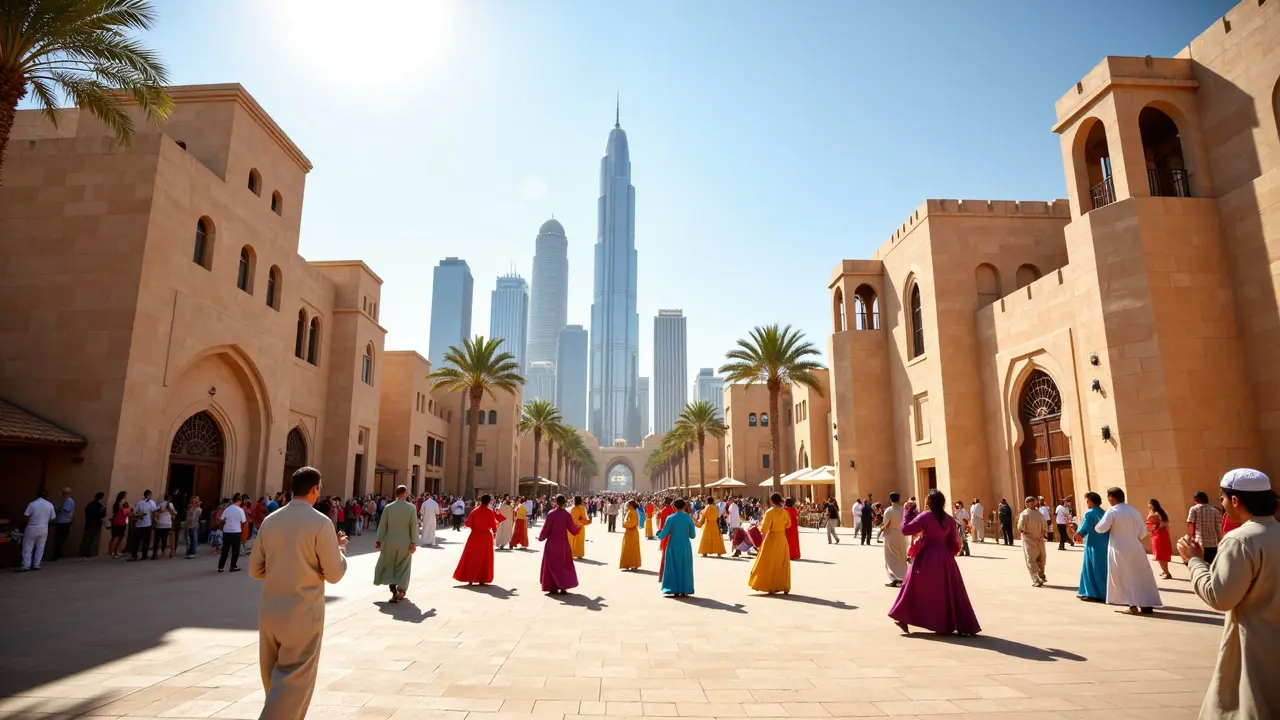
Meeting the Modern: Street Art, Design District, and Museums
If you think Dubai is all about old-school markets, take a closer look at its creative side. There’s more than meets the eye—especially in Alserkal Avenue and Dubai Design District (d3), which have become real hotspots for artists and anyone chasing the city’s modern culture. These spots mix flashy with quirky in a way only Dubai can pull off.
Let’s start with street art. City Walk, La Mer, and even small alleys in Karama are splashed with colorful murals—some are by world-known artists, others by homegrown UAE talent. These make fun photo stops (Instagrammable, for sure) and show what local creativity looks like when it breaks out of galleries. The best way to see them? Just go for a walk, grab your phone, and spot the newest pieces. Some folks sign up for guided street art walking tours—they’re worth it if you like stories behind the walls.
Head to Dubai Design District (d3) and you’ll find something way different from regular malls or business hubs. d3 is full of pop-up installations, art workshops, and design studios. Cool fact: the d3 Art Market draws crowds for its mix of indie fashion, food trucks, and live performances. If you’re curious about working with artists, there’s always a new exhibition or creative talk on their calendar—it’s all listed on the d3 website and Instagram.
Now, museums. This city’s museums aren’t dusty old buildings—they’re new, interactive, and made for hands-on learning. The Etihad Museum dives deep into the history of the United Arab Emirates, showing how the country was formed. If you’re more into science and tech, Museum of the Future is a real eye-opener. Some residents make a habit of popping over to Alserkal Avenue, where you find Leila Heller Gallery and the region’s coolest contemporary art shows, not to mention wild installations during Art Dubai.
- Check museum websites before you go, as hours change during public holidays and Ramadan.
- Lots of exhibitions and pop-ups are free—just double-check online or on Instagram first.
- Photography is allowed in most places, but it’s best to ask before snapping portraits of artists at work.
Dubai culture moves fast—you’ll always find something new, whether you live here or you’re just visiting. Next time you want to ditch the typical tour, swap the big malls for the Dubai culture scene that’s buzzing in these modern creative spaces.
Festivals, Events, and Cultural Classes
If you want to dive into Dubai culture beyond the usual, keep an eye out for the wild mix of festivals, events, and classes going on almost every week. There’s always something happening, from massive city-wide celebrations to hands-on workshops tucked away in creative corners.
The Dubai Shopping Festival grabs the headlines every January—yes, it’s about sales, but it’s also street performances, fireworks, live concerts, and bites from every cuisine you can imagine. For traditional flavor, the Al Marmoom Heritage Festival is worth a trip. Here you’ll see authentic camel racing and folk dances, plus you can try Emirati street snacks for cheap. And during Ramadan, Iftar tents pop up all over the city. Even if you’re not fasting, it’s totally normal (and encouraged) for visitors to gather with locals for sunset meals in massive tented settings.
Got a creative streak? Try an Arabic calligraphy workshop at Tashkeel or the Jameel Arts Centre, or cook up Emirati dishes at one of Frying Pan Adventures’ food tours. There are drumming circles, pottery classes, and even oud lessons at places like The Fridge in Alserkal Avenue. The city runs tons of classes, even for total beginners.
Check out these standout events every year:
- Dubai culture: Dubai International Film Festival – Brings Middle Eastern and global filmmakers together (expected to return soon after its pause).
- Sikka Art & Design Festival – Happens each March in Al Fahidi, showcasing new artists and installations.
- Emirates Airline Festival of Literature – If you’re into books, this one’s huge for meeting authors and joining talks.
- Diwali at Burj Khalifa – Incredible fireworks and Indian food stalls each autumn.
Here’s a handy table to know when these cultural hits land on Dubai’s calendar:
| Event | Usual Months | Location |
|---|---|---|
| Dubai Shopping Festival | January-February | Citywide |
| Al Marmoom Heritage Festival | March-April | Al Marmoom Camel Racetrack |
| Sikka Art & Design Festival | March | Al Fahidi |
| Emirates Airline Festival of Literature | February-March | Dubai Festival City |
| Diwali at Burj Khalifa | October-November | Downtown Dubai |
Thinking of joining a class or event? Reserve early—spots fill up fast, especially for boutique workshops. Dress modestly for anything traditional out of respect, and always ask before snapping photos, especially at family or heritage gatherings. Dive into something new; even if you mess up an Arabic phrase or glue your fingers together in a mosaic class, locals appreciate the effort.
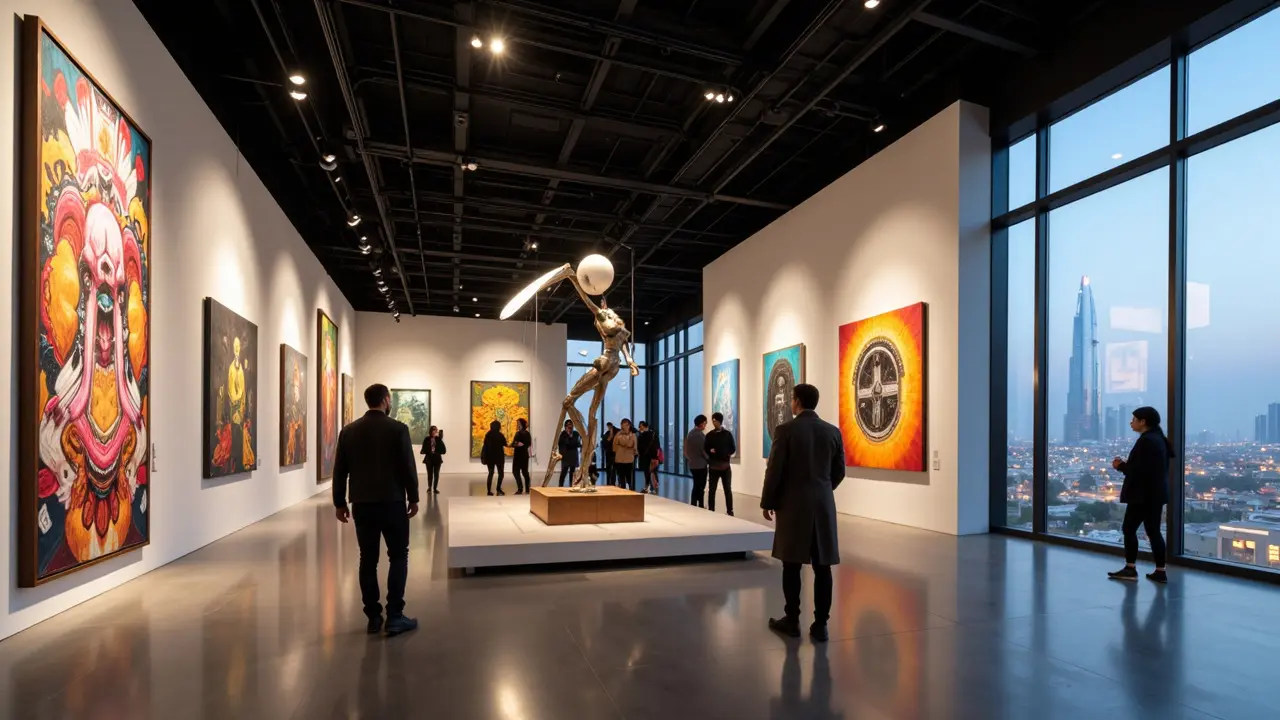
Tips for Respectful Exploring in Dubai
If you want the best out of Dubai culture, a little respect and know-how go a long way. Dubai’s a blend of modern life and traditional values, so locals really appreciate when visitors and residents show some cultural understanding. Nothing too complicated—just basic courtesy and awareness can help you feel welcome and avoid awkward moments.
- Dress right: In malls, mosques, and traditional areas like Al Seef or Al Fahidi, choose clothes that cover shoulders and knees. You don’t have to go full local, but avoid anything super short or see-through.
- Ask before snapping photos: A lot of Dubai’s charm is in its people. But not everyone likes random photos, especially in souks or family areas. Always ask, especially with women or in places of worship.
- Mind public behavior: Public displays of affection, swearing, or loud arguments don’t go down well. Law aside, it’s just good manners in the UAE. Save hugs and kisses for private settings.
- Ramadan etiquette: During Ramadan, no eating, drinking, or smoking in public during daylight hours. Many restaurants have screens or close for daytime hours—plan for this if you’re out and about in fasting season.
- Respect prayer times: If you hear the call to prayer or see people heading to prayers (especially in the old neighborhoods), step aside and keep things low-key for a few minutes. Many shops close briefly for prayers.
- Don’t haggle too hard: Bargaining is a classic part of the souk scene, but keep it light and friendly. Walking away in a huff or arguing ruins the vibe.
Here’s a snapshot of some essential Dubai etiquette and local law pointers:
| Situation | What’s Expected |
|---|---|
| Mosques (e.g. Jumeirah Mosque tours) | Remove shoes, cover arms and legs. Women: headscarf needed. |
| Metro, buses, taxis | No eating, drinking, or chewing gum. Keep your seat in women-only zones (if not female). |
| Friday (weekend day) | Busy prayers in the morning, many small business openings late in the day. |
| Alcohol | Allowed in licensed venues only. Drunk behavior in public is illegal. |
| Visiting Emirati homes | Take off shoes, bring a small gift if invited. Accept coffee with right hand. |
If you ever feel unsure, just ask. Most Dubai locals (both Emiratis and longtime expats) would rather you ask a question than accidentally offend. People here are used to folks from every corner of the world, so you won’t stand out by being polite—you’ll fit right in. That’s the real key to seeing Dubai’s cultural side and making real connections.

